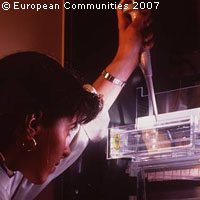Euroscience on ERA: Member States must do more
Euroscience has welcomed the European Commission's Green Paper on the European Research Area (ERA), but notes that more action is needed from the Member States if the ERA is to become a reality. 'So far, the main impediment to progress in implementing the ERA has been the Member States themselves, who jealously and anachronistically guard their positions not realising that the strength of Europe comes from working together and using our diversity rather than creating monolithic approaches,' the organisation writes in its official response to the Green Paper. Euroscience is particularly critical of the way the budget for the Seventh Framework Programme (FP7) was cut during negotiations on the EU's Financial Perspectives. It calls on the Member States to 'show leadership and commitment' by restoring the FP7 budget when the Financial Perspectives are reviewed and then by matching this by increased investments at home. 'Without more funding, neither the ERC [European Research Council] nor a rich landscape of European research infrastructures will be able to develop and so will reduce the attractiveness of the ERA,' Euroscience warns. Mobility is another area where the Member States need to do more, according to Euroscience. 'They must commit to align and harmonise and make sufficiently transferable arrangements for social security and pensions for scientists and engineers of all generations to actually become mobile,' the document states. 'Only then can we truly achieve an internal market for research and researchers.' At the EU level, Euroscience writes that the Commission needs to boost the links between its science and education policies at all levels. 'It would be sad if we will see a European Research Area next to a European Higher Education Area, a European Secondary Education Area, European Innovation Area and so on,' Euroscience states. The organisation calls on the Commission to put forward 'a more unifying concept', which would lead to the creation of a European Knowledge Area. Euroscience also encourages the EU to unequivocally state Europe's aim for global leadership in research. 'We should not be ashamed of this ambition,' Euroscience writes. 'At the same time, our approach should not be inward looking. We must be open and this is the best way of attracting the best brains as the Americans have found in the past.' However, this bid for leadership will only bear fruit if both Member States and the Commission are prepared to 'address institutional and financial weaknesses which have to do with the current inadequate distribution of responsibilities for science, technology and innovation in Europe'. Ultimately, Euroscience is clear that 'research and ERA will only succeed if the groundwork of fiscal policies and investment are in place and coupled with an active defragmentation approach'.



